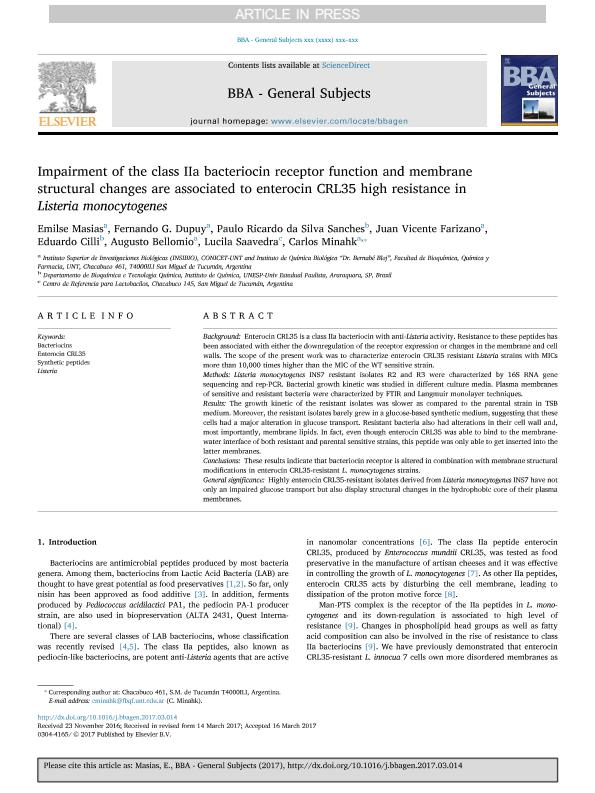Mostrar el registro sencillo del ítem
dc.contributor.author
Masias, Ruth Emilse

dc.contributor.author
Dupuy, Fernando Gabriel

dc.contributor.author
da Silva Sanches, Paulo Ricardo
dc.contributor.author
Farizano, Juan Vicente
dc.contributor.author
Cilli, Eduardo
dc.contributor.author
Bellomio, Augusto

dc.contributor.author
Saavedra, Maria Lucila

dc.contributor.author
Minahk, Carlos
dc.date.available
2017-12-12T16:56:50Z
dc.date.issued
2017-03-18
dc.identifier.citation
Masias, Ruth Emilse; Dupuy, Fernando Gabriel; da Silva Sanches, Paulo Ricardo; Farizano, Juan Vicente; Cilli, Eduardo; et al.; Impairment of the class IIa bacteriocin receptor function and membrane structural changes are associated to enterocin CRL35 high resistance in Listeria monocytogenes; Elsevier Science; Biochimica et Biophysica Acta- General Subjects; 1861; 7; 18-3-2017; 1770-1776
dc.identifier.issn
0304-4165
dc.identifier.uri
http://hdl.handle.net/11336/30293
dc.description.abstract
Background: Enterocin CRL35 is a class IIa bacteriocin with anti-Listeria activity. Resistance to these peptides has been associated with either the downregulation of the receptor expression or changes in the membrane and cell walls. The scope of the present work was to characterize enterocin CRL35 resistant Listeria strains with MICs more than 10,000 times higher than the MIC of the WT sensitive strain. Methods: Listeria monocytogenes INS7 resistant isolates R2 and R3 were characterized by 16S RNA gene sequencing and rep-PCR. Bacterial growth kinetic was studied in different culture media. Plasma membranes of sensitive and resistant bacteria were characterized by FTIR and Langmuir monolayer techniques. Results: The growth kinetic of the resistant isolates was slower as compared to the parental strain in TSB medium. Moreover, the resistant isolates barely grew in a glucose-based synthetic medium, suggesting that these cells had a major alteration in glucose transport. Resistant bacteria also had alterations in their cell wall and, most importantly, membrane lipids. In fact, even though enterocin CRL35 was able to bind to the membrane-water interface of both resistant and parental sensitive strains, this peptide was only able to get inserted into the latter membranes. Conclusions: These results indicate that bacteriocin receptor is altered in combination with membrane structural modifications in enterocin CRL35-resistant L. monocytogenes strains. General significance: Highly enterocin CRL35-resistant isolates derived from Listeria monocytogenes INS7 have not only an impaired glucose transport but also display structural changes in the hydrophobic core of their plasma membranes.
dc.format
application/pdf
dc.language.iso
eng
dc.publisher
Elsevier Science

dc.rights
info:eu-repo/semantics/openAccess
dc.rights.uri
https://creativecommons.org/licenses/by-nc-sa/2.5/ar/
dc.subject
Bacteriocins
dc.subject
Enterocin Crl35
dc.subject
Listeria
dc.subject
Synthetic Peptides
dc.subject.classification
Otras Ciencias Biológicas

dc.subject.classification
Ciencias Biológicas

dc.subject.classification
CIENCIAS NATURALES Y EXACTAS

dc.title
Impairment of the class IIa bacteriocin receptor function and membrane structural changes are associated to enterocin CRL35 high resistance in Listeria monocytogenes
dc.type
info:eu-repo/semantics/article
dc.type
info:ar-repo/semantics/artículo
dc.type
info:eu-repo/semantics/publishedVersion
dc.date.updated
2017-12-04T18:20:53Z
dc.identifier.eissn
1878-2434
dc.journal.volume
1861
dc.journal.number
7
dc.journal.pagination
1770-1776
dc.journal.pais
Países Bajos

dc.journal.ciudad
Amsterdam
dc.description.fil
Fil: Masias, Ruth Emilse. Consejo Nacional de Investigaciones Científicas y Técnicas. Centro Científico Tecnológico Conicet - Tucumán. Instituto Superior de Investigaciones Biológicas. Universidad Nacional de Tucumán. Instituto Superior de Investigaciones Biológicas; Argentina
dc.description.fil
Fil: Dupuy, Fernando Gabriel. Consejo Nacional de Investigaciones Científicas y Técnicas. Centro Científico Tecnológico Conicet - Tucumán. Instituto Superior de Investigaciones Biológicas. Universidad Nacional de Tucumán. Instituto Superior de Investigaciones Biológicas; Argentina
dc.description.fil
Fil: da Silva Sanches, Paulo Ricardo. Universidade Estadual Paulista Julio de Mesquita Filho; Brasil
dc.description.fil
Fil: Farizano, Juan Vicente. Consejo Nacional de Investigaciones Científicas y Técnicas. Centro Científico Tecnológico Conicet - Tucumán. Instituto Superior de Investigaciones Biológicas. Universidad Nacional de Tucumán. Instituto Superior de Investigaciones Biológicas; Argentina
dc.description.fil
Fil: Cilli, Eduardo. Universidade Estadual Paulista Julio de Mesquita Filho; Brasil
dc.description.fil
Fil: Bellomio, Augusto. Consejo Nacional de Investigaciones Científicas y Técnicas. Centro Científico Tecnológico Conicet - Tucumán. Instituto Superior de Investigaciones Biológicas. Universidad Nacional de Tucumán. Instituto Superior de Investigaciones Biológicas; Argentina
dc.description.fil
Fil: Saavedra, Maria Lucila. Consejo Nacional de Investigaciones Científicas y Técnicas. Centro Científico Tecnológico Conicet - Tucuman. Centro de Referencia Para Lactobacilos; Argentina
dc.description.fil
Fil: Minahk, Carlos. Consejo Nacional de Investigaciones Científicas y Técnicas. Centro Científico Tecnológico Conicet - Tucumán. Instituto Superior de Investigaciones Biológicas. Universidad Nacional de Tucumán. Instituto Superior de Investigaciones Biológicas; Argentina
dc.journal.title
Biochimica et Biophysica Acta- General Subjects

dc.relation.alternativeid
info:eu-repo/semantics/altIdentifier/doi/http://dx.doi.org/10.1016/j.bbagen.2017.03.014
dc.relation.alternativeid
info:eu-repo/semantics/altIdentifier/url/http://www.sciencedirect.com/science/article/pii/S0304416517300971?via%3Dihub
dc.relation.alternativeid
info:eu-repo/semantics/altIdentifier/url/http://www.sciencedirect.com/science/journal/03044165/1861/7
Archivos asociados
